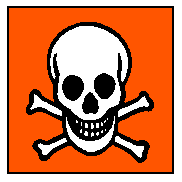International Chemical Safety Cards
| 2-METHOXYETHYL ACETATE | ICSC: 0476 |
| 2-METHOXYETHYL ACETATE Ethylene glycol monomethyl ether acetate 2-Methoxyethanol acetate Acetic acid, 2-methoxyethyl ester Methyl cellosolve acetate C5H10O3 / CH3COOCH2CH2OCH3 Molecular mass: 118.1 CAS # 110-49-6 RTECS # KL5950000 ICSC # 0476 UN # 1189 EC # 607-036-00-1 |
 |
| TYPES OF HAZARD/ EXPOSURE |
ACUTE HAZARDS/ SYMPTOMS |
PREVENTION | FIRST AID/ FIRE FIGHTING |
| FIRE | Flammable. |
NO open flames, NO sparks,
and NO smoking. |
Powder, alcohol-resistant
foam, water spray, carbon dioxide. |
| EXPLOSION | Above 45°C explosive
vapour/air mixtures may be formed. |
Above 45°C use a closed
system, ventilation, and explosion-proof electrical equipment. |
In case of fire: keep
drums, etc., cool by spraying with water. |
| EXPOSURE | |
STRICT HYGIENE! AVOID
EXPOSURE OF (PREGNANT) WOMEN! |
|
| INHALATION | (See Ingestion). |
Ventilation, local exhaust,
or breathing protection. |
Fresh air, rest. Refer for
medical attention. |
| SKIN | MAY BE ABSORBED! (see
Ingestion). |
Protective gloves.
Protective clothing. |
Remove contaminated
clothes. Rinse skin with plenty of water or shower. Refer for medical attention. |
| EYES | Redness. |
Face shield, or eye
protection in combination with breathing protection. |
First rinse with plenty of
water for several minutes (remove contact lenses if easily possible), then take to a
doctor. |
| INGESTION | Abdominal pain. Confusion.
Dizziness. Drowsiness. Headache. Nausea. Vomiting. Weakness. Unconsciousness. |
Do not eat, drink, or smoke
during work. |
Rinse mouth. Refer for
medical attention. |
| SPILLAGE DISPOSAL | STORAGE | PACKAGING & LABELLING | ||
| Collect leaking and spilled
liquid in sealable containers as far as possible. Absorb remaining liquid in sand or
inert absorbent and remove to safe place. Do NOT let this chemical enter the environment
(extra personal protection: A filter for organic vapours). |
Fireproof. Separated from
strong oxidants, strong bases, strong acids, and nitrates. |
T symbol R: 60-61-20/21/22 S: 53-45 Note: E UN Hazard Class: 3 UN Packing Group: III |
||
| SEE IMPORTANT INFORMATION ON BACK | ||||
|
||||